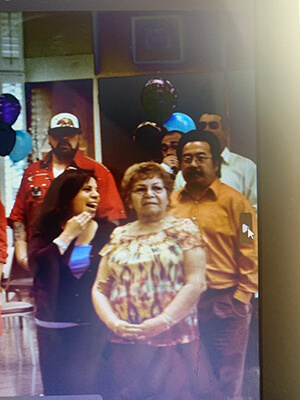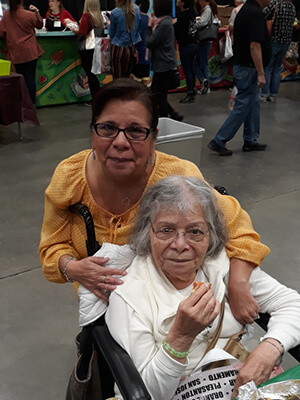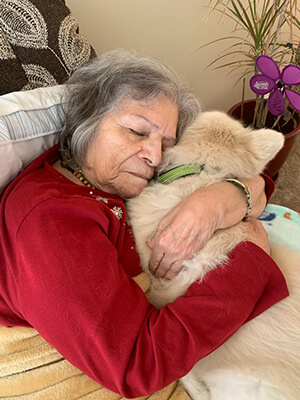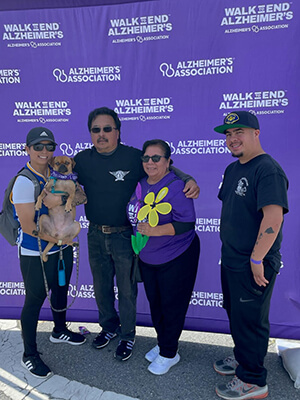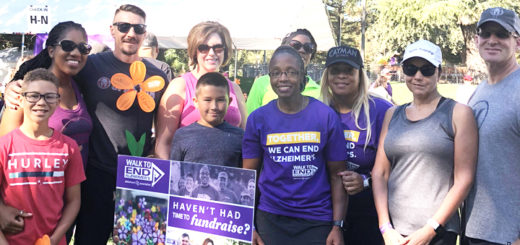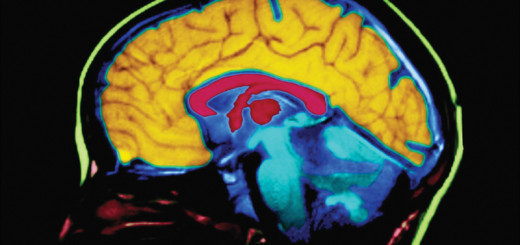Hispanic family keeps promise to care for mom in her own home
In 2019, Birdie’s mother Margarita was diagnosed with Alzheimer’s disease. At the same time, her mother-in-law was also living with the disease. While her husband was caring for his own mother, Birdie moved in with hers. To help with both grandmothers, Birdie’s son was able to transfer his job in Hawaii to California and move home. Birdie shares how her family came together to fulfill their promise to help Margarita stay in the house she bought until the day she died.
A rough beginning
Margarita did not have an easy time as a child and young woman. Growing up in El Salvador, at the young age of three, her mother died in childbirth. Margarita was separated from her siblings and raised by her Godmother. At 17, she and her Godmother moved to the United States where Margarita met her husband and was married the next year. By the time she was 25 she had five children.
Margarita’s marriage ended in a terrible divorce 20 years later. Now with six kids, she was resilient. She never asked her ex-husband for money and found a way to put herself through business school. She took on three jobs and was able to purchase her first car and own her own home. Unfortunately, in the early 1990s, Margarita lost three of her adult children and sunk into a depression. It was only the reminder of her three remaining children that she was able to get move forward.
Despite the tragedies in her life, Margarita was fun and loved being with friends and family. She was always the first to offer to help. She enjoyed dancing, gambling and going out to dinner. “Her big tradition was to make tamales,” said Bertha “Birdie” one of Margarita’s two daughters. “She loved having everyone over. I learned all my cooking [from her]. At nine-years-old I’d pull up a chair and watch my mom cook. To this day we continue her tradition of making tamales for the holidays.”
Getting lost
People living with memory changes from Alzheimer’s or other dementia often find it hard to complete daily tasks. Sometimes they may have trouble driving to a familiar location, organizing a grocery list or remembering the rules of a favorite game.
When Margarita called Birdie telling her she was lost driving from her friend’s house after Bible Study, Birdie’s first thought was not dementia. “I didn’t think much about it,” said Birdie. “She called me, but she wasn’t hysterical. She told me she left a friend’s house after church and didn’t know where she was. I knew where her friend lived and asked her to look for a street sign. [I got her back to the main street] and boom she remembered where she was.”
As it came time to renew her driver’s license, Margarita failed the written test three times. Margarita was understandably upset, but Birdie stepped in and told her mother that she would drive her wherever she needed to go.
Diagnosis
Bridie tried repeatedly to get her mother to a doctor to be evaluated for dementia. However, each time Margarita would get upset because she couldn’t answer the questions and would walk out. “Mom got frustrated because she felt like she was being stupid,” said Birdie. “The third time we went to the doctor, the doctor finally said, ‘I’m going to diagnose your mom with Alzheimer’s, she couldn’t answer the simplest question.’”
In addition to her problems with cognition, Margarita had started falling frequently. Some people living with Alzheimer’s or other dementia could experience vision changes. This may lead to difficulty with balance. “This was her fourth fall,” said Birdie. “I didn’t want people thinking she was being abandoned.”
Palliative care
In August of 2019, Margarita had a follow up appoint with her doctor. Birdie expressed her concern that her mother was starting to lose weight. By October Margarita had lost nearly 50 pounds. After a worried call to her mother’s doctor, Margarita was put on palliative care.
Palliative care is medical care for people living with a serious illness – it is available to people with dementia. It focuses on symptom and pain relief while also providing support for the best quality of life for the patient and the family. It can be provided along with disease treatment and be started at any stage in a serious illness.
Between the falling and the move to palliative care Birdie knew it was time to move in with her mother. “I said, ‘Okay it’s time for me to be there with her and help her out,” said Birdie. “I had an understanding with my husband. He understood that I wanted to be my mom’s caregiver. I lived with her for the next three years.”
Help from her kids
According to the Alzheimer’s Association 2023 Alzheimer’s Disease Facts and Figures report, approximately 13% of Hispanics who are 65 or older have Alzheimer’s or another dementia. They are one-and-a-half times more likely than Whites to have dementia.
The 2021 report on Race, Ethnicity and Alzheimer’s in America reports that 68% of unpaid Hispanic caregivers, like Birdie, provide assistance with personal care, such as bathing, eating or dressing. While 64% of caregivers report that caregiving is stressful, 92% say it is also rewarding.
During this same time, Birdie’s mother-in-law also had dementia. While Birdie was caring for her mother, her husband was caring for his. On weekends, Birdie would hire a caregiver for a few hours to watch her mother, so she could visit and spend time with her mother-in-law.
However, during the COVID-19 pandemic Birdie felt like she was trapped at home. Luckily, Birdie’s son, who had recently moved to Hawaii, decided he was needed more at home. He was able to transfer his job to California so he could be there to help his mother care for his grandmother. “Both of his grandmothers were progressing,” said Birdie. “He felt like he needed to be with family. He moved in with me and was my right hand. He helped with all of his grandmother’s needs and was not embarrassed about it.”
Because of the help her son provided, Birdie was able to get out of the house and do things for herself. She was able to go to lunch with a friend or go to her own home. “I was a prisoner in my own home,” said Birdie. “[My son] was a God send.”
Birdie’s daughter, who lived locally with her partner also helped when they could. They’d buy Margarita’s groceries and would sit with her when Birdie needed to get out of the house. Sometimes, Margarita would fall in the middle of the night, and Birdies daughter had no problem coming in the middle of the night to help pick her up. “My daughter would immediately come over to help in getting her grandma up and back to her bed,” said Birdie. “This was at any time of the night with no hesitation. I’m blessed with two kids. My kids had a big role in her care.”
Help from her siblings
Birdie’s two remaining siblings also stepped in to help on occasion. Birdie’s brother lived in Boston and did his best to help out from afar. Using Alexa, he would chat with Margarita while Birdie did yard work, sometimes listening to music from Margarita’s youth. There were several times when Birdie wanted to go on a mini vacation with her husband and her bother would come out for weeks at a time to care for their mother.
Birdie’s sister, who lives closer, had younger grandchildren she was caring for and couldn’t easily get away. She would occasionally help care for her mother on weekends and came down a couple of times near the end of Margarita’s life.
A hug goodbye
On the night of September 26, 2022, Margarita apologized to Birdie, holding her hand tight, and Birdie had a feeling her mother wouldn’t be with her much longer. “That night I hugged her and told her it’s time to go Mom,” said Birdie. “I’ve done everything I can to take your pain away but now it’s time for God to take you. Just think, you have three beautiful sons waiting for you on the other side. They’ll take good care of you – but not as good as me.”
Margarita died in her sleep that night. Five months later to the day, Birdie’s mother-in-law also died. “I told my husband both our moms, they got together and said ‘Our kids can have their lives back. They did everything for us,’” said Birdie. “I lived with my mom for the last three years of her life, I have no regrets. If anything, it gave me joy to know that she had the best care in her own home. I love you MOM!!”
The Alzheimer’s Association
The Association offers free courses that cover dozens of topics, including Alzheimer’s basics and caregiving advice. Classes are offered both virtually as well as in-person and are open to all.
Birdie found the Alzheimer’s Association through internet research. She was able to attend education classes on dementia which taught her how to better care for her mother. “[Taking a class] was the best thing I ever did,” said Birdie. “It gave me an understanding of what [Mom] was going through.”
Birdie also learned about the Alzheimer’s Association Walk to End Alzheimer’s® in San Francisco, which she first participated in 2019. “The first year was the year we had the fire season, so they cut the walk short,” said Birdie. “I just did [Walk] again and had my husband, son and daughter with me. After, we went to the cemetery.”
Advice for other caregivers
The Facts and Figures report states that 57% of Hispanics believe that memory loss is a “normal part of aging.” Hispanics are twice as likely to say they would not see a doctor if they experience thinking or memory problems.
Because of the stigma around dementia, many people in the Hispanic community don’t talk about what their family is going through. Birdie thinks this is a mistake. “I know some people don’t talk about [the disease] for whatever reason,” said Birdie. “ You need to find out how to deal with this disease because if you don’t, it’s going to make the disease worse for you and your love one.”
Birdie reminds caregivers to have a lot of patience, do a lot of research and talk to people who have gone through this before.
“I would advise caregivers that [their loved one] needs stimulation,” said Birdie. “Have face to face communication, love them, hug them, hold hands and tell them I love you because all of that matter to them and it makes things easier.
It’s not going to be a 100% perfect day. If it’s a bad day, let it go. Tomorrow is a different day. They’re not going to remember the bad day or that they were in bad mood they’re going to wake up and [not remember]. You let that bad day go and start fresh, [Today] is a good day.”
The Alzheimer’s Association offers both in-person and virtual education opportunities. To find one near you visit alz.org/communityresourcefinder or call our 24/7 Helpline at 800.272.3900.





